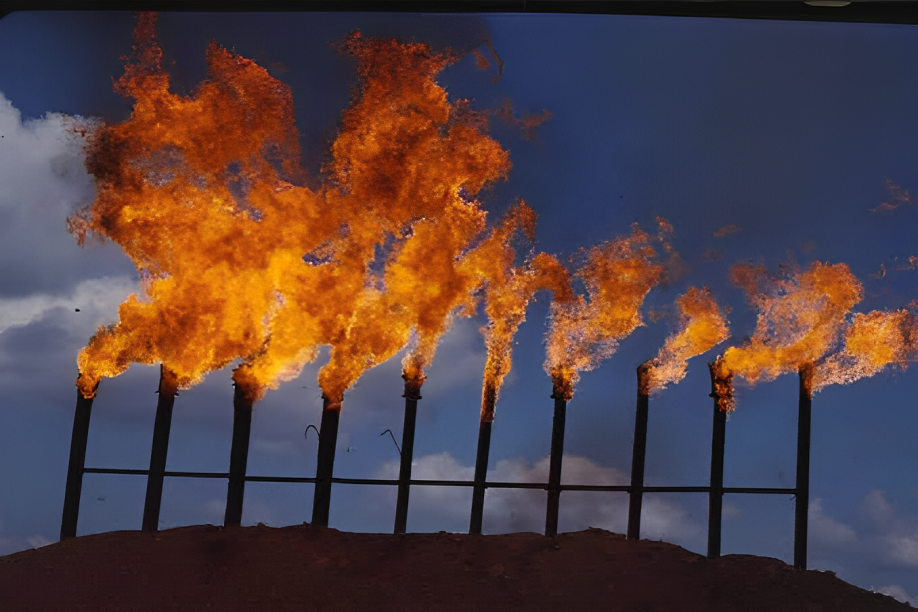Nigeria, Africa’s largest oil producer, has been burning off its natural gas for decades, wasting a valuable resource and harming the environment. But with new policies and technologies, the country could turn its gas flaring problem into an opportunity for economic development and clean energy.
Gas flaring is the practice of burning off excess gas that is produced along with crude oil during extraction. It is a common sight in Nigeria’s oil-rich Niger Delta region, where towering flames light up the night sky and emit greenhouse gases and pollutants.
According to data from the Nigeria Gas Flare Tracker, a satellite-based technology created by the National Oil Spill Detection and Response Agency (NOSDRA), the country flared about 241.1 billion standard cubic feet of gas worth $843 million from January to November 2023. This is equivalent to the annual gas consumption of 10 million households, according to the World Bank.
Gas flaring not only wastes a potential source of energy and revenue but also contributes to climate change and public health problems. The World Bank estimates that gas flaring globally accounts for more than 400 million tons of carbon dioxide emissions per year, making it one of the largest sources of greenhouse gas emissions from the oil and gas sector. In Nigeria, gas flaring is also linked to respiratory diseases, acid rain, crop failures, and social unrest among local communities.
Nigeria has pledged to end routine gas flaring by 2030, as part of its commitments under the Paris Agreement on climate change. The country has also set a target of increasing its domestic gas utilization to 5 billion cubic feet per day by 2027, up from the current 1.5 billion cubic feet per day.
To achieve these goals, the government has introduced several policies and initiatives, such as the Nigerian Gas Flare Commercialisation Programme (NGFCP), the National Gas Expansion Programme (NGEP), and the Petroleum Industry Act (PIA).
The NGFCP, launched in 2016, aims to attract private investors to capture and utilize flared gas for various purposes, such as power generation, cooking, heating, cooling, and transportation. The program offers incentives, such as tax waivers, guaranteed gas prices, and access to infrastructure, to encourage participation. So far, the program has received over 200 bids from local and international companies and is expected to award the first set of licenses by the end of 2023.
The NGEP, launched in 2020, seeks to promote the use of compressed natural gas (CNG) and liquefied petroleum gas (LPG) as alternative fuels for vehicles and households, respectively. The program aims to create 12.5 million jobs, reduce gas flaring by 80 percent, and save $2.5 billion in fuel subsidies annually. The program also plans to establish 50 CNG and LPG filling stations across the country, and convert 1 million vehicles and 5 million households to gas-powered systems by 2025.
The PIA, signed into law in 2021, is a landmark legislation that overhauls the governance and fiscal framework of the oil and gas sector. The act provides clarity and certainty for investors and creates a dedicated agency for midstream and downstream gas development, the Nigerian Midstream and Downstream Petroleum Regulatory Authority (NMDPRA). The act also imposes stricter penalties for gas flaring, ranging from $0.5 to $2 per 1,000 standard cubic feet of gas flared, depending on the level of compliance.
Industry experts and stakeholders have welcomed these initiatives but also stressed the need for effective implementation, coordination, and monitoring. They also called for more investment in gas infrastructure, such as pipelines, processing plants, and storage facilities, as well as gas pricing reforms, to ensure the viability and sustainability of gas projects.
Nigeria has the potential to become a gas hub in Africa and to leverage its abundant gas resources for economic diversification, industrialization, and social development. By ending gas flaring and increasing gas utilization, the country can also reduce its greenhouse gas emissions and improve its environmental performance. The challenge is to translate its policies and plans into action and results.
Source: BusinessDay



